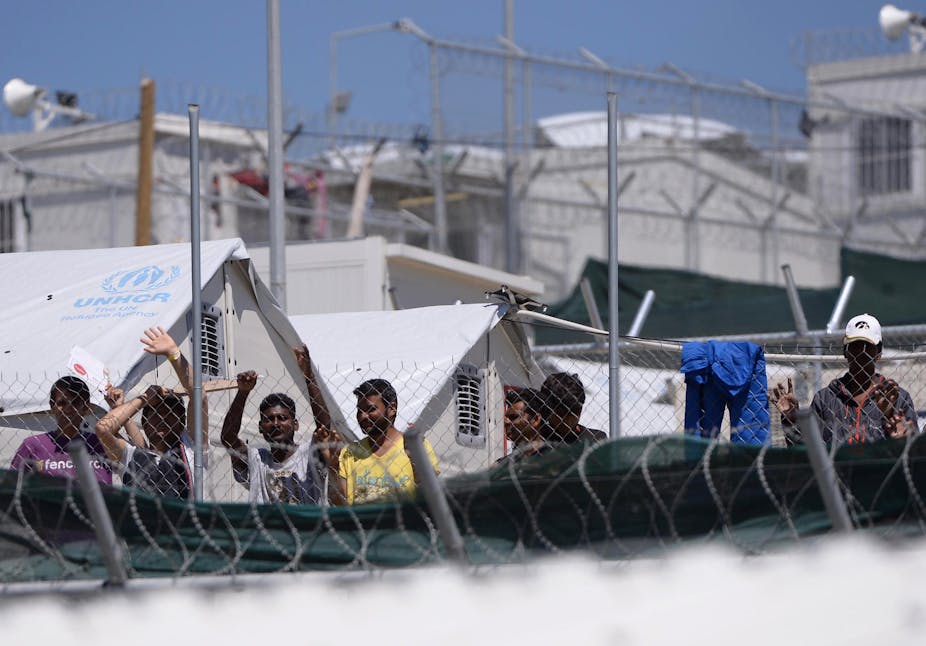The Greek authority that handles appeals by asylum seekers recently overturned a decision to reject the application of a Syrian refugee who arrived in Greece from Turkey.
The original decision had turned on the fact that Turkey is a country where the applicant would have access to refugee protection in line with the standards of international law. The appeal authority took the opposite view. It raises questions about the recent EU-Turkey agreement which allows the return of migrants arriving on the Greek islands to Turkey – and it could have implications for the management of the refugee crisis across the EU.
The EU-Turkey agreement stipulates, among other things, that all migrants who have arrived at Greek islands from Turkey unauthorised since March 20 can be returned. This also includes Syrians and non-Syrians whose applications for asylum have failed.
According to EU law, asylum seekers can be returned to a “safe third country”, namely one that will give them access to refugee protection in accordance with the 1951 Geneva convention; and where they will not be at risk of persecution, serious harm or being returned to the country they fled. A key assumption behind the EU-Turkey agreement is that Turkey is such a country.
In April, Turkey gave assurances to the EU that all returned migrants would have access to asylum; and passed a law granting temporary protection to the returning Syrian refugees. Yet there are serious concerns on whether Turkey is in practice a safe third country. It has not ratified the 1967 Protocol of the Geneva Convention, which extended the original international refugee rules to non-European claimants.
Its asylum procedures have significant shortcomings; and access to the labour market, health and education for refugees remains problematic despite recent legal changes. In addition there are reports of forcible returns to Syria, which violates one of the key principles of the convention (“non-refoulement”).
The decision of the Greek Appeals Authority appears to have been influenced by these concerns. The Greek media has speculated that the decision could suspend returns of Syrian refugees. Yet this might be off the mark. While 386 non-Syrians have been returned under the EU-Turkey agreement, no Syrians have been forcibly returned yet according to official data. Having said that, according to the Greek Asylum Service, as many as 89 asylum applications had been rejected by May 5 on the basis that Turkey is a safe third country. The asylum seekers in question have not been returned, but they now could be.

The new Greek procedure
The decision was reportedly the first one taken by the appeals authority, and it remains to be seen whether future ones will follow the same rationale. The rejected applications were examined under a new asylum law passed in Greece in April to ensure the implementation of the EU/Turkey agreement.
The new law introduced an “exceptional” procedure for examining applications at the reception and identification centres on the Greek islands. This procedure, to be followed in cases of (undefined) mass arrivals, has considerably shorter time limits than the existing procedures. Applicants have just one day to prepare for their interview and the decision can be issued within one day. Rejected applicants have five days to appeal, and the appeal is examined within three days of submission. In addition, migrants in the reception and identification centres are now being detained for up to 28 days, and access to the asylum procedure and legal aid is problematic.
The short time limits – along with the volume of applications and staff shortages – raise questions about the quality of decision making, especially when it comes to applying the concept of a safe third country. Decisions appear to have used a standard formulation that asserted Turkey is a safe third country without providing any detailed justification. This goes against the EU’s own asylum procedures directive, which requires that the asylum authorities consider and explain why a particular country is “safe” given the individual circumstances of the asylum seeker.
Decisions that don’t properly apply the existing requirements around safe third countries and asylum procedures are more likely to be overturned by the Greek appeal authorities. If they keep overturning decisions on these grounds, it will pose an increasingly strong challenge to both the current decision-making practices by the Greek Asylum Service and the EU-Turkey agreement as a whole.
Lessons for the EU?
The decision sends a message to the EU that the application of the safe third country concept should respect the international and European laws around refugee protection.
It could also have implications elsewhere in the EU. On June 1 the EU/Turkey readmission agreement will come into force. This agreement will allow any member state to return migrants and failed asylum seekers to Turkey who travelled to the EU through the country. This may mean that other asylum authorities will have to consider the question of Turkey as a safe third country, and could mean that they find themselves with the same dilemma as Greece.

EU policy, for reasons of political expediency, has assumed that Turkey is a safe country for the return of migrants and refugees. From June 1, the question is whether asylum authorities across the union are going to prioritise refugee protection instead.

